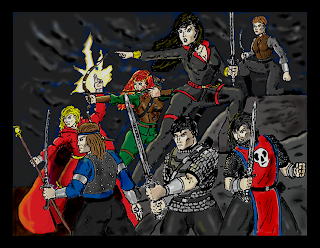Imagination is a word that you would think would go hand-in hand with table-top RPGs. I mean the idea behind such games is to imagine adventures within the parameters of given set of rules. Like a good novel, an RPG gaming session should paint a mental picture of a fictional setting and allow the players and game master to walk a mile or two in the shoes of a fictional character that is larger than life, fantastically heroic or despicably villainous. RPG settings and rules were not designed to hinder imagination. They were designed to help develop it.
Unfortunately, some (perhaps even most) RPG players focus on the rules, detailed campaign settings, and the dice and never bother to imagine the action the settings, rules, and die-rolling are supposed to represent. They roll initiative, attacks, and saving throws and never develop a mental image of the drama that the GM (if he is doing it right) is trying to describe. The GM and the players should be collaborating on telling a good story. The drama and fun come from the unpredictability of people with different talents, interests, and personalities as they compliment or conflict with one another. Throw in the unpredictability of the dice bouncing across the table, and you have a fun, challenging session that can be strung together with other such sessions to make a campaign that can be a source of entertainment and camaraderie that can last for years. Some call this “fluff,” but what it really is imagination and creativity.
For example, in one of our sessions from a long-running campaign, a paladin of mine slew a green dragon. That one sentence tells you what happened. But, if that were the way my DM and I had described the encounter at the time, we would have forgotten about it. I would have the experience points, and some treasure that was found afterward, but that was all. But we didn’t stop at stating what happened, we described how it happened in glorious ‘fluffy’ detail.
The adventuring party had just fought its way through dozens of dragon cultists only to find ourselves faced with a dragon with several of members of our band unconscious or dead and the others critically short on hit points. We were in no shape to fight a dragon. To top it all off, of the characters that were still on their feet, only my paladin made his saving throw against dragon fear. He stood there, his bloody two-handed sword in hand, facing a pissed off mass of scales, claws and teeth.
The situation was grim. My DM described the scene. (This was years ago, so the exact words escape me) “The dragon circles angrily above. Half of your friends lie wounded or dead on the ground. The others are paralyzed with fear. Rungalor (the strongest and most dangerous member of our group) pisses himself in terror. They can only stare at the circling wyrm as if hypnotized by the scaled death that awaits them.”
Thoroughly engrossed in the unfolding narrative, I tried to keep the spirit of the moment going. "Andared (my paladin) leaps to the attack, yelling a plea for Tyr ( his patron deity) to aid him.”
Andared had discovered a pair of boots of leaping and springing earlier in the adventure but, at that moment, I had forgotten that. So, when I said that he “leaps to the attack,” I underestimated the enormity of my leaping assault. I won the initiative roll, and bounced my most trusted twenty-sided die across clipboard that lay on the carpet where we were playing. It landed on a twenty!
As a house rule, we used a critical hit table that my DM had composed himself. It had twelve possible outcomes. The DM rolled a d-twelve and it landed on a twelve which, on that table, was an automatic kill. Here, he could have said simply "you killed it". The adventure would have been over, experience points and treasure would have been divided, and the night would have ended on less that memorable note. But, thus was my tried and true DM.
“Your leap propels you many man-heights into the air. You feel the hand of Tyr (remember, Andared evoked Tyr’s aid earlier) guiding your sword arm as your blade descends unerringly towards the wyrm’s neck! Your sword slices through the neck, spraying you with gore and silencing the beast’s anguished cries of rage and agony. You land lightly; leaving the two twitching parts of the dragon behind you, it’s blood thickly coating the floor.”
Honestly, as imaginative and eloquent as the DM is, I doubt he was that poetic in his descriptions ad-libbed on the fly that night, but he did do a damn good of painting a fantastic mental image of the action. Instead of remembering a few die-rolls and some marks on my character sheet, I have an epic battle to remember and recount time and time again. Taking the time to get beyond the physical trappings of the game, we created a great moment in our gaming history (and our friendship).
I suppose it’s natural to get distracted by the artwork in the books, the intricate rules, the fantastically detailed settings, and (my favorites) the shinny, multi-colored dice. But I think the fun is in the imagination and mutual story telling that all of those things facilitate and support. It’s about imagination, not dice.
